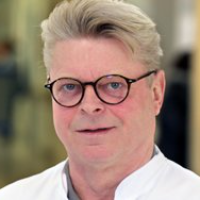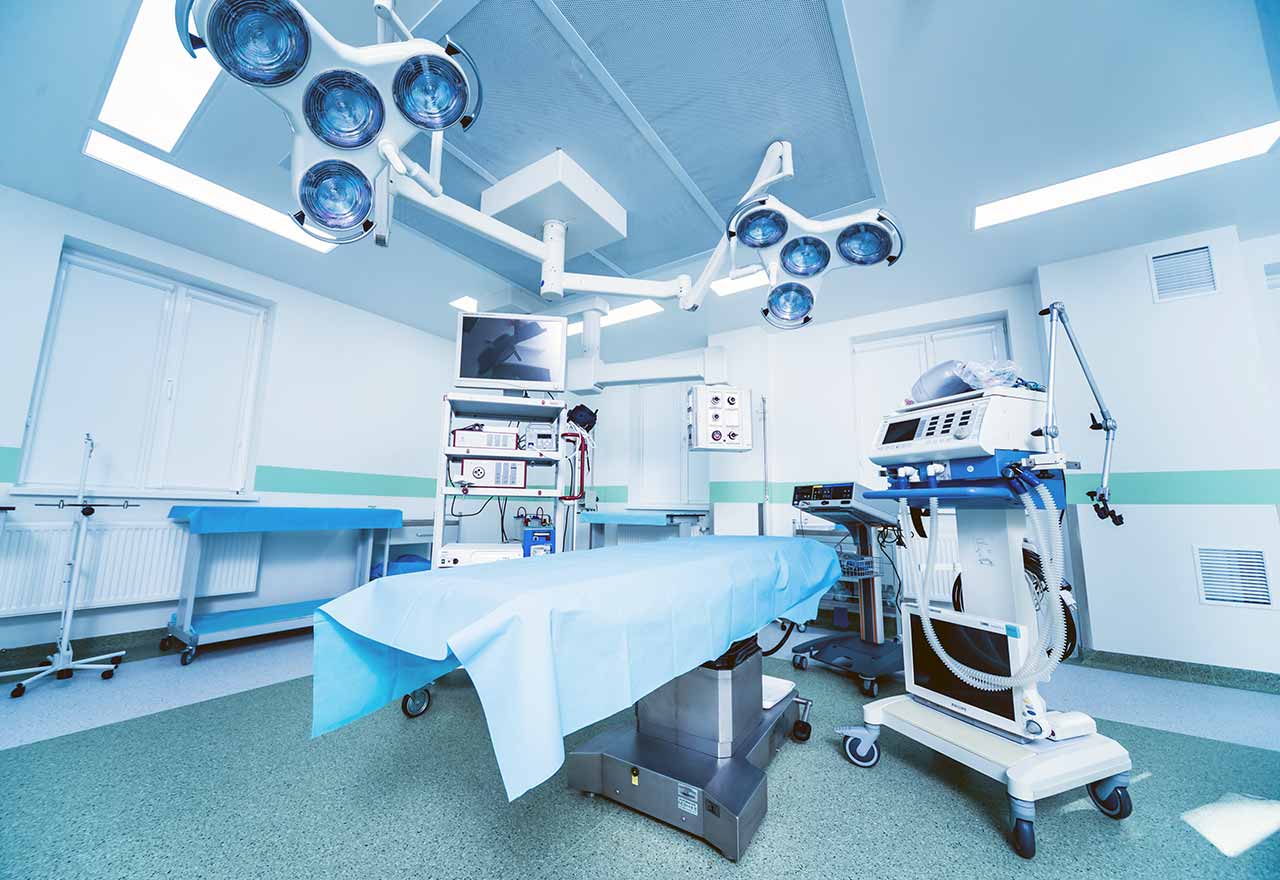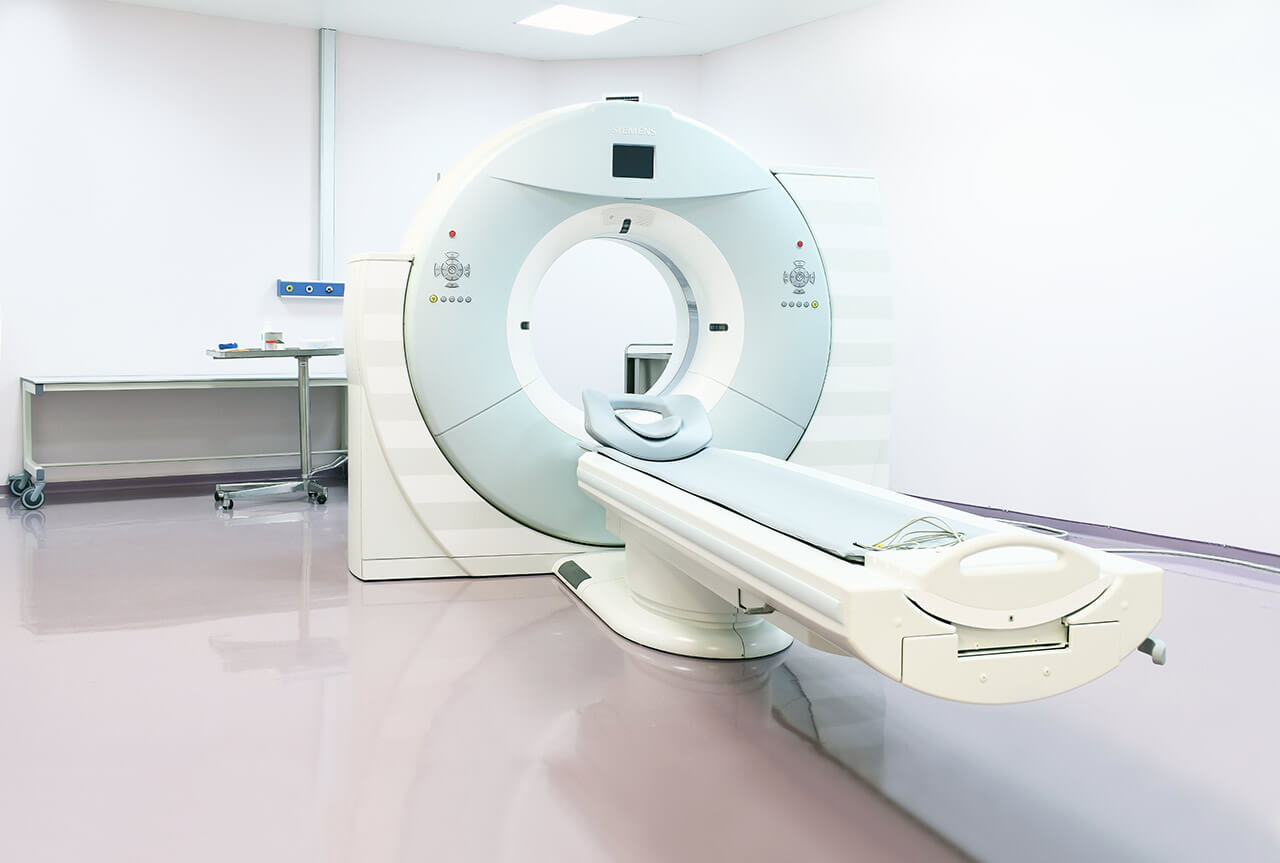
The program includes:
- Initial presentation in the clinic
- clinical history taking
- general clinical examination
- laboratory tests:
- complete blood count
- general urine analysis
- biochemical analysis of blood
- TSH-basal, fT3, fT4
- tumor markers
- thyroid autoantibodies
- indicators of inflammation
- indicators of blood coagulation
- thyroid ultrasound
- CT scan of the thyroid gland (on indication 650 €)
- MRI scan of the thyroid gland (on indication 1200 €)
- thyroid scintigraphy
- biopsy of the thyroid tumor with histological examination (on indication 2000 €)
- nursing services
- consultation of related specialists
- consultation of the chief physician and all leading experts
- development of individual treatment plan
- written statement
Required documents
- Medical records
- MRI/CT scan (not older than 3 months)
- Biopsy results (if available)
Service
You may also book:
 BookingHealth Price from:
BookingHealth Price from:
About the department
The Department of Abdominal, Colorectal, Endocrine and Thoracic Surgery, Hernia Surgery at the St. Remigius Hospital Opladen Leverkusen offers surgical treatment of various diseases of the gastrointestinal tract, lungs, chest wall and mediastinum, rectum, thyroid and parathyroid glands. The department also successfully performs operations for inguinal, umbilical and incisional hernias. The department has 45 beds for patient accommodation. The department has at its disposal two operating rooms equipped with the very latest technology. Therapeutic options include both inpatient and outpatient surgery. With appropriate indications, preference is given to sparing minimally invasive interventions, which can significantly reduce the postoperative recovery period. The department's surgeons take a responsible approach to each clinical case and provide patients with the effective and safe treatment. The Head Physician of the department is Dr. med. Dirk Wassenberg.
The department's pride is its advanced technical base. The medical facility has equipment for laparoscopic surgery, systems for interventional endoscopic procedures, ultrasound dissectors, argon plasma coagulation devices, systems for sonography (including endosonography, transrectal sonography, intraoperative sonography), intraoperative neuromonitoring systems for the prevention of recurrent nerve injury during thyroid surgery, hemostasis devices, surgical lasers, etc. Such advanced technologies, combined with the exceptional professionalism of the department's doctors, guarantee an optimal result and a quick health restoration.
In the field of abdominal surgery, in addition to benign diseases (for example, gastric ulcers, polyps in the stomach and intestines, gastroesophageal reflux disease), special attention is also paid to the treatment of malignant diseases of the digestive tract. Particular focus is on colon cancer surgery. Pathologists, radiologists and oncologists develop an individual treatment program for each patient during interdisciplinary boards. Since a surgical intervention alone is not always sufficient to achieve the desired result, the department's specialists combine operations with chemotherapy and radiation therapy. The Colon Cancer Center has been certified in accordance with DIN EN ISO 9001:2008 standards, which confirms the highest quality of treatment. The department's abdominal surgeons also often deal with the treatment of patients with stomach and pancreatic cancer, liver cancer, including liver metastases.
The department also admits patients with rectal pathologies. Colorectal surgeons most commonly deal with such diagnoses as hemorrhoids, anal fistulas, anal fissures, and abscesses. The specialists have excellent professional skills in the field of fecal incontinence surgery. They also successfully perform operations for chronic constipation and pelvic organ prolapse. Surgical options in the field of colorectal surgery are complemented by the surgical treatment of anal cancer.
The department's team of endocrine surgeons is responsible for performing operations to treat thyroid and parathyroid diseases. The advanced surgical techniques, such as neuromonitoring and ultrasound dissection, avoid complications, for example, vocal cord paralysis. The specialization in this field covers the treatment of nodular goiter, Graves' disease, hyperthyroidism, hyperparathyroidism, thyroid tumors and other pathologies. When performing surgical treatment, surgeons strive to remove pathological tissues as much as possible with minimal damage to the healthy ones, and also to avoid revision interventions.
Thoracic surgeons treat benign and malignant diseases of the lungs, pleura, and mediastinum. A special focus is on the treatment of malignant lung tumors. The operation gives the highest chance of cure in case of the limited tumor spread. The size of the tumor and its localization determine the required extent of the surgical intervention. The standard techniques are the removal of one lobe of the lung and organ-preserving operations, as well as the removal of the entire lung (pneumonectomy). In most patients, organ-preserving surgery avoids pneumonectomy, which used to be the standard surgical technique. This improves the quality of life of patients, and also provides more options for follow-up radiation therapy or chemotherapy. Another priority area of the department's work is the surgical treatment of lung metastases. Thanks to a new surgical method using a diode laser, it is possible to destroy secondary lesions as accurately as possible, reducing damage to the healthy tissues by 90%.
The department's therapeutic offer is complemented by the treatment of hernias: inguinal, umbilical and incisional. Surgeons perform various types of hernioplasty to repair hernias, including totally extraperitoneal hernioplasty with a polypropylene mesh, transabdominal hernia repair with a polypropylene mesh, and Lichtenstein operation. All hernia repair procedures are performed by the department's surgeons using minimally invasive techniques, so the hospitalization period is minimal, and the patient can return to normal life as quickly as possible. In addition, such operations leave no scars, and there is practically no pain syndrome.
The department's key clinical areas include:
- Abdominal surgery
- Surgical treatment of benign and malignant bowel diseases
- Bowel cancer
- Diverticular disease
- Surgical treatment of benign and malignant stomach diseases
- Stomach cancer
- Stomach ulcer
- Benign stomach neoplasms
- Gastroesophageal reflux disease
- Surgical treatment of benign and malignant liver diseases
- Liver tumors
- Liver metastases
- Surgical treatment of benign and malignant pancreatic diseases
- Pancreatic cancer
- Acute and chronic pancreatitis
- Tumors of the endocrine section of the pancreas
- Surgical treatment of benign and malignant bowel diseases
- Colorectal surgery
- Surgical treatment of rectal diseases
- Anal cancer
- Hemorrhoids
- Anal fistulas, fissures and abscesses
- Chronic constipation
- Pelvic organ prolapse
- Fecal incontinence
- Surgical treatment of rectal diseases
- Surgical treatment of hernias
- Surgical treatment of inguinal, umbilical and incisional hernias
- Endocrine surgery
- Surgical treatment of thyroid and parathyroid diseases
- Nodular goiter
- Graves' disease
- Hyperthyroidism
- Hyperparathyroidism
- Thyroid and parathyroid tumors
- Surgical treatment of thyroid and parathyroid diseases
- Thoracic surgery
- Surgical treatment of non-small cell lung cancer
- Surgical removal of lung metastases (surgery using a diode laser)
- Surgical treatment of pleural mesothelioma (pleural cancer)
- Surgical treatment of mediastinal tumors
- Surgical treatment of chest wall tumors
- Pectus excavatum correction
- Other surgical services
Curriculum vitae
Since 2005, Dr. med. Dirk Wassenberg has been heading the Department of Abdominal, Colorectal, Endocrine and Thoracic Surgery, Hernia Surgery at the St. Remigius Hospital Opladen Leverkusen. Prior to this, Dr. Wassenberg worked in hospitals in Heidelberg and Hamburg. He has more than 20 years of successful clinical practice.
Dr. med. Dirk Wassenberg is a member of many professional societies: the German Society of Surgery, the Association of German Surgeons, the German Society for Abdominal Surgery, the German Society for Thoracic Surgery, the European Society of Thoracic Surgeons, the Association of Surgeons of Lower Rhine-Westphalia and the Working Group of Cancer Thoracic Surgery of the German Cancer Society.
Photo of the doctor: (c) Katholische Kranken- und Pflegeeinrichtungen Leverkusen GmbH
About hospital
The St. Remigius Hospital Opladen Leverkusen provides medical services in accordance with the highest standards. It is part of the Kplus Group, which unites more than twenty medical facilities. All hospitals of the group are not only distinguished by high-quality healthcare services, but also adhere to the Christian beliefs. The hospital's priority focuses are gastroenterology, cardiology, pulmonology, abdominal and thoracic surgery, orthopedics and arthroplasty, treatment of spinal diseases, gynecology and obstetrics. The medical center has an advanced technical base and well-equipped operating rooms, in which experienced surgeons successfully perform both common and especially complex surgical interventions.
The hospital annually diagnoses and treats more than 13,000 inpatients and about 20,000 outpatients. The hospital's medical team consists of more than 300 employees who apply all their experience and skills to restore the health of patients. In addition, doctors and nursing staff strive to surround the patient with care and create the most comfortable conditions for everyone.
The hospital regularly confirms the special quality of medical services, patient care and treatment with awards and certificates from professional medical societies. In 2004, a quality management system was introduced here, the implementation of which was subsequently confirmed by DIN EN ISO 9001:2008 certification. Since October 2012, the Department of Orthopedics and Traumatology was among the first 16 medical facilities in Germany to be recognized as a certified Maximum Care Endoprosthetics Center. In addition, the department meets all the requirements of the German Society of Trauma Surgery in the field of medical care for patients with severe injuries and is a certified Regional Trauma Center. The hospital also has the quality certificate of the German Society for Spine Surgery (DGW).
The goal of all medical personnel of the hospital is to meet the constantly changing standards in healthcare, as well as to satisfy all the needs and wishes of their patients and guarantee them an optimal treatment outcome.
Photo: (с) depositphotos
Accommodation in hospital
Patients rooms
The patients of the St. Remigius Hospital Opladen Leverkusen live in comfortable rooms with a modern design. The standard room includes an automatically adjustable bed, a bedside table, a wardrobe for storing personal belongings, a TV and a radio (for free). Each patient room is also equipped with an ensuite bathroom with shower and toilet. The rooms have access to Wi-Fi.
Meals and Menus
The hospital has an excellent program of three meals a day, the basis of which is the use of freshest and highest quality products in accordance with professional recommendations for a healthy diet. Depending on dietary recommendations and personal preferences, the patients can order an individual menu.
Further details
Standard rooms include:
Religion
The divine service takes place in the chapel of the hospital on the ground floor on Mondays at 7 p.m. Eucharistic service is held on Thursdays from 4 p.m. to 5 p.m.
Religious services are available upon request.
Accompanying person
Your accompanying person may stay with you in your patient room or at the hotel of your choice during the inpatient program.
Hotel
You may stay at the hotel of your choice during the outpatient program. Our managers will support you for selecting the best option.




